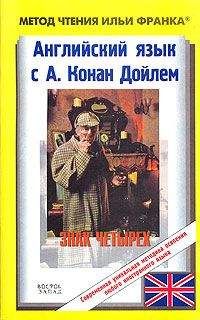"Good-night, gentlemen both," said Jonathan Small (спокойной ночи, джентльмены: «оба джентльмена», — сказал Джонатан Смолл).
"You first, Small," remarked the wary Jones as they left the room (после вас: «вы первый», Смолл, — заметил осторожный Джонс, когда они выходили из комнаты). "I'll take particular care that you don't club me with your wooden leg (я обращу особенное внимание, чтобы ты не огрел меня по голове своей деревянной ногой; to club — наносить удар, бить), whatever you may have done to the gentleman at the Andaman Isles (что бы ты там ни сделал с джентльменом на Андаманских островах)."
"Well, and there is the end of our little drama," I remarked (ну, вот и конец нашей маленькой драмы, — заметил я), after we had sat some time smoking in silence (после того как мы, молча куря, просидели некоторое время). "I fear that it may be the last investigation in which I shall have the chance of studying your methods (боюсь, что это может оказаться последним расследованием, в котором мне повезло: «имею шанс» изучать ваши методы). Miss Morstan has done me the honour to accept me as a husband in prospective (мисс Морстен оказала мне честь, согласившись стать моей женой: «приняв меня в качестве будущего мужа»; prospective — будущий; предполагаемый)."
connoisseur [ˌkɔnǝˈsǝ:], investigation [ɪnˌvestɪˈɡeɪʃ(ǝ)n], accept [ǝkˈsept]
"Is there any other point which you would like to ask about?" asked the convict, affably.
"I think not, thank you," my companion answered.
"Well, Holmes," said Athelney Jones, "you are a man to be humoured, and we all know that you are a connoisseur of crime, but duty is duty, and I have gone rather far in doing what you and your friend asked me. I shall feel more at ease when we have our story-teller here safe under lock and key. The cab still waits, and there are two inspectors down-stairs. I am much obliged to you both for your assistance. Of course you will be wanted at the trial. Good-night to you."
"Good-night, gentlemen both," said Jonathan Small.
"You first, Small," remarked the wary Jones as they left the room. "I'll take particular care that you don't club me with your wooden leg, whatever you may have done to the gentleman at the Andaman Isles."
"Well, and there is the end of our little drama," I remarked, after we had sat some time smoking in silence. "I fear that it may be the last investigation in which I shall have the chance of studying your methods. Miss Morstan has done me the honour to accept me as a husband in prospective."
He gave a most dismal groan (он издал стон отчаяния: «очень печальный стон»; dismal — мрачный; печальный). "I feared as much," said he (я так и боялся, — сказал он). "I really cannot congratulate you (я решительно не могу поздравить вас; really — действительно, в самом деле; по правде говоря)."
I was a little hurt (я был немного задет; to hurt — причинить боль; ранить; задевать, обижать). "Have you any reason to be dissatisfied with my choice?" I asked (у вас есть какие-нибудь основания не одобрить мой выбор: «быть неудовлетворенным моим выбором»? — спросил я; to satisfy — удовлетворять).
"Not at all (вовсе нет). I think she is one of the most charming young ladies I ever met (я думаю, что она одна из наиболее очаровательных молодых леди, которых я когда-либо встречал), and might have been most useful in such work as we have been doing (и могла бы быть весьма полезна в такой работе, какую мы выполняем). She had a decided genius that way (у нее определенный талант в этом направлении; to decide — решать; decided — точный, определенный; бесспорный, явный): witness the way in which she preserved that Agra plan from all the other papers of her father (обратите внимание на то, как она сохранила этот план Агры из всех бумаг своего отца; to witness — быть свидетелем). But love is an emotional thing (но любовь — это из области эмоций: «эмоциональная вещь»), and whatever is emotional is opposed to that true cold reason which I place above all things (а все, что относится к эмоциям, противостоит тому истинно холодному рассудку, что я ставлю превыше всего; to oppose — быть против, возражать; противопоставлять; reason — причина, повод; разум, рассудок, ум). I should never marry myself, lest I bias my judgment (я сам никогда не женюсь, дабы не сделать пристрастными свои суждения; to bias — склонять; оказывать влияние)."
"I trust," said I, laughing, "that my judgment may survive the ordeal (я полагаю, — сказал я, смеясь, — что моя рассудительность переживет это тяжелое испытание; to trust — верить, доверять; надеяться; полагать; ordeal — суровое испытание). But you look weary (но вы выглядите уставшим)."
"Yes, the reaction is already upon me (да, начинается реакция). I shall be as limp as a rag for a week (теперь я неделю буду как выжатый лимон; as limp as a rag — совершенно измученный, измотанный, измочаленный: «мягкий/нежесткий, как тряпка»)."
"Strange," said I, "how terms of what in another man I should call laziness (странно, — сказал я, — как проявления того, что в другом человеке я назвал бы ленью; term — срок, определенный период; язык, способ выражения; lazy — ленивый) alternate with your fits of splendid energy and vigour (перемежаются у вас с вспышками бешеной энергии; to alternate — сменять друг друга; чередоваться, перемежаться; fit — припадок, приступ; порыв, вспышка; splendid — роскошный, великолепный; производящий впечатление; выдающийся; vigour — сила, энергия)."
ordeal [ɔ:ˈdi:l], vigour [ˈvɪɡǝ]
He gave a most dismal groan. "I feared as much," said he. "I really cannot congratulate you."
I was a little hurt. "Have you any reason to be dissatisfied with my choice?" I asked.
"Not at all. I think she is one of the most charming young ladies I ever met, and might have been most useful in such work as we have been doing. She had a decided genius that way: witness the way in which she preserved that Agra plan from all the other papers of her father. But love is an emotional thing, and whatever is emotional is opposed to that true cold reason which I place above all things. I should never marry myself, lest I bias my judgment."
"I trust," said I, laughing, "that my judgment may survive the ordeal. But you look weary."
"Yes, the reaction is already upon me. I shall be as limp as a rag for a week."
"Strange," said I, "how terms of what in another man I should call laziness alternate with your fits of splendid energy and vigour."
"Yes," he answered, "there are in me the makings of a very fine loafer (да, — ответил он, — во мне задатки законченного бездельника; making — создание, становление; изготовление; makings — задатки; fine — тонкий, утонченный; совершенный; высокопробный; to loaf — проводить время в безделье; бездельничать) and also of a pretty spry sort of fellow (соседствующие с чертами весьма подвижного человека: «а также довольно подвижного типа человека»; spry — активный, живой, деятельный). I often think of those lines of old Goethe (я часто вспоминаю эти строчки старика Гете), —
Schade dass die Natur nur einen Mensch aus dir schuf (жаль, что природа всего лишь одного человека из тебя создала),
Denn zum würdigen Mann war und zum Schelmen der Stoff (так как и для достойного человека, и для плута /достало бы/ материала).
By the way, à propos of this Norwood business (между прочим, по поводу этого норвудского дела), you see that they had, as I surmised, a confederate in the house (вы видите, что у них, как я и предполагал, был сообщник в доме; to surmise — предполагать, подозревать; confederate — союзник, сторонник; сообщник, соучастник; пособник), who could be none other than Lal Rao, the butler (кто не может быть никем иным, как Лалом Рао, дворецким): so Jones actually has the undivided honour of having caught one fish in his great haul (так что Джонсу в самом деле принадлежит единоличная честь поимки одной рыбы в его большом улове; undivided — неразделенный, целый; единый; to catch — ловить; поймать; схватить; haul — перевозка, тяга; улов)."
"The division seems rather unfair," I remarked (распределение наград выглядит достаточно несправедливым, — заметил я; division — деление, разделение; распределение). "You have done all the work in this business (все в этом деле сделано вами). I get a wife out of it (мне достается жена как его результат), Jones gets the credit (Джонс получает славу; credit — доверие, вера; заслуга, честь), pray what remains for you (а что, скажите пожалуйста, достанется вам; to pray — молиться; молить, просить)?"
"For me," said Sherlock Holmes, "there still remains the cocaine-bottle (мне, — сказал Шерлок Холмс, — по-прежнему остается пузырек с кокаином)." And he stretched his long white hand up for it (и он протянул свою длинную белую руку за ним).
surmise [sǝˈmaɪz], haul [hɔ:l]
"Yes," he answered, "there are in me the makings of a very fine loafer and also of a pretty spry sort of fellow. I often think of those lines of old Goethe, —
Schade dass die Natur nur einen Mensch aus dir schuf,
Denn zum würdigen Mann war und zum Schelmen der Stoff.
By the way, à propos of this Norwood business, you see that they had, as I surmised, a confederate in the house, who could be none other than Lal Rao, the butler: so Jones actually has the undivided honour of having caught one fish in his great haul."
"The division seems rather unfair," I remarked. "You have done all the work in this business. I get a wife out of it, Jones gets the credit, pray what remains for you?"
"For me," said Sherlock Holmes, "there still remains the cocaine-bottle." And he stretched his long white hand up for it.
THE END.
Видимо, имеется в виду «маска Гиппократа» — Hippocratic face — описана Гиппократом как признак тяжелых заболеваний органов брюшной полости: запавшие глаза, заостренный нос, синевато-бледная кожа, покрытая каплями холодного пота.
По объяснению древних — смех, напоминающий судорожную гримасу, вызываемую отравлением произраставшей на острове Сардиния /Сардония/ ядовитой травой.
Blondin — видимо, имеется в виду Жан-Франсуа Гравле, сценическое имя Блондин, французский канатоходец и акробат, прославился тем, что первым прошел по канату над Ниагарским водопадом.
Martini bullet = Martini-Henry Rifle bullet; Martini-Henry Rifle — армейская винтовка, первая модификация принята на вооружение в Британии в 1871 году, была основным оружием в последовавших колониальных войнах.



